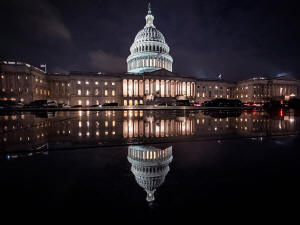Republican legislation seeks to ban Chinese nationals from studying in
the US
[March 15, 2025]
By FU TING
WASHINGTON (AP) — A group of House Republicans on Friday put forward
legislation seeking to prevent Chinese students from studying in
American schools, as some U.S. lawmakers are targeting China over
national security concerns.
Rep. Riley Moore, R-W.Va., introduced the bill that could bar Chinese
nationals from receiving visas that allow foreigners to travel to the
U.S. to study or participate in exchange visitor programs. Five other
Republicans co-sponsored the measure.
By granting Chinese nationals such visas, the U.S. has “invited” the
Chinese Communist Party "to spy on our military, steal our intellectual
property, and threaten national security,” Moore said in a statement.
“It’s time we turn off the spigot and immediately ban all student visas
going to Chinese nationals.”
The measure is unlikely to pass, and it has drawn criticism from
organizations and scholars over concerns that hostile policies and
rhetoric toward Chinese students could hurt U.S. interests.
“No policy should target individuals solely on the basis of their
national origin," Fanta Aw, executive director and CEO of NAFSA, an
association of international educators, said in a statement.
"Making international students — the most vetted and tracked
nonimmigrants in the United States — a scapegoat for xenophobic and
anti-Chinese sentiment is misguided and antithetical to our national
interest," Aw said.
Liu Pengyu, spokesman for the Chinese embassy in Washington, said China
“expresses strong concern and firmly opposes such practices." He said
education exchange and cooperation has long served as a pillar for the
stable development of China-U.S. relations.

The Asian American Scholars Forum said such legislation would harm the
talent pipeline of Asian American scientists, scholars and researchers,
undermining U.S. leadership in science and innovation.
[to top of second column]
|

The Capitol in Washington, Friday, Dec. 20, 2024. (AP Photo/J. Scott
Applewhite, File)

Despite the bill's slim chance of getting approved, Yangyang Cheng,
research scholar at Yale Law School’s Paul Tsai China Center, said
the bill “should be seen as part of a broader effort to restrict
academic freedom and hurt higher education in this country, to
control what can be taught, which research projects can be pursued,
and who have access to the classrooms and laboratories.”
In the 2023-24 school year, more than 277,000 Chinese students were
studying in U.S. universities, or a quarter of the total number of
international students, according to an annual report on
international students from the Institute of International
Education. The number of Chinese students in the U.S., however, has
been declining for years. Last year, China lost its status to India
as the top feeder country of international students.
In 2023, Florida passed a law prohibiting state universities from
hiring students from China and six other countries for graduate
assistant and postdoc positions., and it's been challenged in court.
Several U.S. universities have ended academic partnerships with
Chinese schools amid mounting pressure from Republican lawmakers
over national security concerns.
Reactions on China’s social media to the new legislation were
varied. Some who said they had recently received offers from
American schools expressed concerns, some dismissed it as "a
political show,” and some called it “another Chinese Exclusion Act.”
___
AP writer Didi Tang in Washington contributed to the report.
All contents © copyright 2025 Associated Press. All rights reserved |